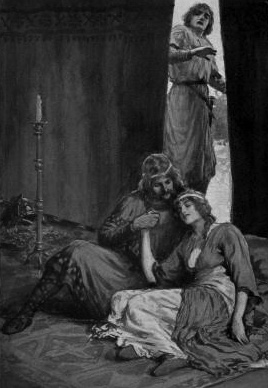The Villanized Victim in Sir Thomas Malory’s Pelleas and Ettard
By Megan Brodeur.
Sir Thomas Malory depicts an unreciprocated courtly love relationship in the Medieval version of Pelleas and Ettard. Pelleas is depicted as a devout lover who abides by courtly love rules. However, Ettard refuses his love and orders her men to torture him for his trespassing. Pelleas withstands the torture to catch a glimpse of his lady. After Pelleas discovers that Ettard and Sir Gawain have slept together his affection for her is diminished. The Lady of the Lake casts an enchantment that makes Ettard fall desperately in love with the man who now hates her. At the end of the story, Ettard dies of sorrow after being rejected by Pelleas. Meanwhile, the Lady of the Lake and Pelleas are given a happy ending.
Although Ettard is portrayed as a Medieval antihero in the story, I see her as a victim from a modern perspective. Courtly love in Medieval society requires that Pelleas pursue Ettard despite her rejection. His subservient attitude doesn’t extend to her ultimate desire, which is to be left alone. Malory emphasizes the suffering of Pelleas and the cruelty of Ettard, without considering how he is harassing a woman who isn’t interested. When we remove the idea of courtly love, Pelleas is obviously in the wrong. She attempts to show him mercy by not ordering her knights to kill him, despite him repeatedly trespassing on her lands. She doesn’t hate him. In fact, when Sir Gawain delivers the news of Pelleas’ death, she expresses her condolences and admits that he was a good knight. She merely wanted him to be a good knight far away from her.
One of the most troubling and overlooked aspects of Malory’s story is the sexual relationship between Sir Gawain and Ettard. Sir Gawain promises Pelleas that he would win over Ettard for him. Pelleas gives him his armor and agrees for Sir Gawain to visit Ettard and report his death. After singing Pelleas’ praises, he believes that Ettard will be ecstatic to find out he’s alive. Instead, Sir Gawain deceives not only Pelleas but also Ettard. However, there is much less of a focus on Ettard’s suffering. Pelleas received a broken heart from losing what never belonged to him. Sir Gawain coerces Ettard into sleeping with him, by giving her the impression that he had slain Pelleas. As a result, he puts Ettard’s life in jeopardy. Pelleas contemplates murdering them both when he finds them in bed together. His “mercy” is considered a result of either cowardice or a moral compass. What isn’t addressed is why he feels justified in killing them. He views Ettard as a prize that he’s entitled. She’s a possession that Sir Gawain has stolen from him. She’s no longer “pure” in the eyes of Pelleas and therefore is no longer valuable to him.






